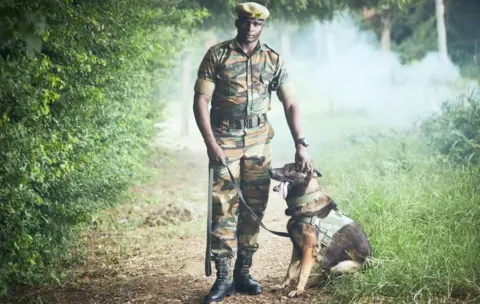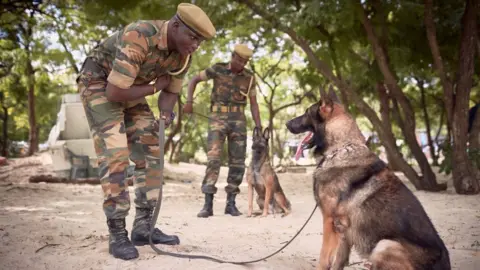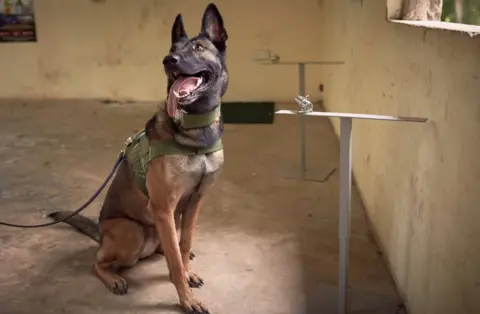Meet an ivory trafficker's 'worst nightmare'
 WWF
WWFA groundbreaking technique looks set to turn man's best friend into a trafficker's worst nightmare.
It will allow dogs to sniff out ivory, rhino horn and other illegal wildlife products hidden in large shipping containers, using a tiny sample of air.
The method is being trialled at Kenya's Mombasa port - said to be Africa's most active hub for ivory trafficking.
According to one report, more than 18,000kg of ivory was seized at the port between 2009 and 2014.
To produce that much ivory, the report suggests more than 2,400 elephants may have died - and that is only the ivory they found.
But conservationist Drew McVey is hopeful that statistics like that could soon be a thing of the past.
"This technique could be a game-changer, reducing the number of endangered animal parts finding their way into overseas markets like south-east Asia," he said.
"Dogs' incredible sense of smell means they can sniff out even the tiniest amount in a 40-foot container.
"As organised criminal syndicates use ever more sophisticated methods to hide and transport illegal wildlife products it is vital that we continue to evolve our efforts to disrupt the barbaric trade."
 WWF
WWFThe new Remote Air Sampling for Canine Olfaction (Rasco) will see air sucked out of targeted shipping containers and passed through filters.
These filters will then be presented to specially trained dogs, who will sit down if they smell anything suspicious items - from ivory to illicit animals, plants and timber products
The scheme is run jointly by the WWF global conservation group, the wildlife trade monitoring network Traffic and the Kenya Wildlife Service (KWS). It will also allow the dogs to check more of the roughly 2,000 shipping containers which pass through Mombasa port each day.
Previously, they had to go container by container, not easy under the glare of the east African sun.
 WWF
WWFWhile time consuming, this method had led to 26 successful seizures in just six months, giving authorities crucial information about the criminal networks which make millions each year from the illegal trade.
But they are still in a race against time.
The WWF estimates there are only about 25,000 black and white rhinos left, and more than 1,000 were killed by poachers in South Africa alone last year.
Meanwhile, the conservation group estimates around 55 African elephants are killed each day for their ivory.
